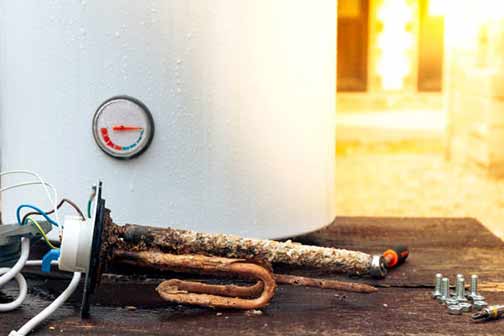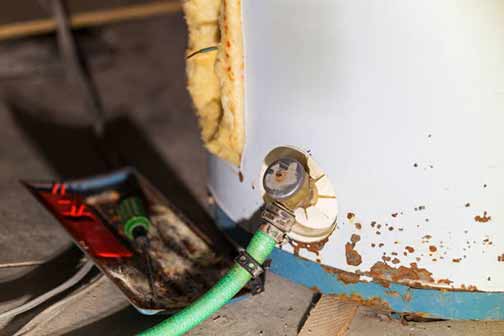
Why do water heaters become clogged with sediment? Since it is only fresh, clean water that enters the unit, why is there buildup inside the tank? If you are dealing with water heater issues in your home and asking these questions, this page will provide answers.
Here is a fact you should know about your home’s fresh water supply.
The water that enters your water heater is not entirely “pure.” Just like in nature, that water carries a lot of dissolved minerals inside it, explains Yourway Management. These dissolved minerals are not harmful to your body, but they can have unintended consequences on your plumbing.
Causes of sediment buildup inside a water heater
There are three major reasons why sediment builds up inside a water heater:
Water sources
All naturally occurring water sources contain dissolved minerals. These minerals enter the water as they travel through different rock strata before reaching the surface. The type and quantity of dissolved minerals in water depend on the geology of an area.
Regions that have subterranean rock layers with high levels of calcium and magnesium usually see higher rates of buildup. Due to the presence of large volumes of salts in the water supply, the rate of sedimentation inside water heaters will be higher.
Improper water heater maintenance
When water evaporates, the dissolved minerals are deposited on the walls, bottom and internal components of the water heater. These deposits can only be removed by proper maintenance. If this is not done, that buildup can become a problem.
Faulty water heater components
Corroded metal parts inside a water heater can break down into small particles deposited inside the tank. If these parts are not replaced on time or the tank Is cleaned, the damaged components can worsen the problem of buildup inside the tank.
How sediment buildup affects your water heater
The two major impacts of buildup in a water heater are diminished performance and a shorter lifespan. These can show up in several ways:
Irregular water temperature
Sediment inside your water heater tank can impair the unit’s ability to heat water effectively or to retain the temperature of heated water. This will cause drastic and sudden changes in the temperature of your hot water.
Rising energy bills
Sediment inside a water heater impairs its ability to heat water efficiently. The water heater will use up more energy than it should. This inefficiency can result in strange spikes in your home’s energy consumption.
Insufficient hot water
A clogged water heater will have trouble keeping up with your home’s demand for hot water. Where it once supplied enough hot water for the shower and appliances, its ability to continue to meet this demand will fall sharply.
Overheating water heater tank
The water heater’s ability to regulate its temperature will be severely affected, making the tank prone to overheating. An overheating water heater tank poses a serious safety risk because it can explode.

What to do about sediment buildup inside a water heater
To solve the problems caused by sediment buildup inside your water heater, you can do the following:
Flush the tank on a schedule
Flushing your water heater tank regularly is the number one step to minimize the impact of buildup and prevent water heater damage. Depending on whether your water Is hard or soft, you should flush the water heater tank twice a year or more. Flushing a water heater tank is not hard at all. This task can easily be DIY-ed, but if you have trouble figuring out the right way, please contact your local plumber.
Do a vinegar soak
The humble vinegar, commonly found in kitchens, is one of the best materials for dissolving buildup. Soaking the tank in a vinegar solution will help get rid of sediment that still sticks inside the tank after you have finished draining it. Pour a gallon of cider vinegar into the tank, after closing the drain valve and let it sit for six hours. Flush the tank again to get rid of the vinegar.
Install a water softener
This is a long-term solution for homes with hard water issues. A water softener will remove the salt ions that cause water hardness. This will not only save your water heater from excessive buildup, it will improve the function and longevity of your plumbing and water-utilizing appliance, and make everyday household activities like washing and taking a shower easier.
To conclude, depending on how far gone the problem is, the best solution may be to replace your water heater.
If some of the internal components of the water heater have been damaged by buildup, it may still be possible to repair them.
But if the tank is corroded, and leaking, the option that makes the most economic sense is to replace the water heater immediately.

